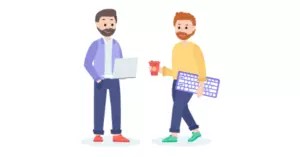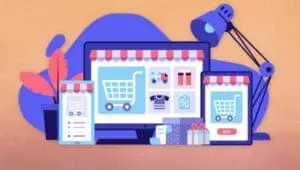Why Learn To Code? Learning to code empowers you with valuable problem-solving skills, opens doors to high-demand careers, and fuels your creativity in the digital landscape. At LEARNS.EDU.VN, we believe that mastering coding is not just about writing lines of code; it’s about unlocking a world of opportunities and enhancing your capabilities in the modern era. Start your coding journey today and explore the vast potential of computer programming, software development, and web development.
1. Anyone Can Embark on a Coding Journey
The beauty of coding lies in its accessibility – anyone, regardless of age, gender, or background, can learn to code. The outdated notion that coding is reserved for math and science geniuses is simply untrue. While analytical thinking is helpful, a genuine interest and willingness to learn are the most crucial ingredients for success.
1.1 Self-Guided Learning: Empowering Your Coding Education
The digital age has democratized education, and coding is no exception. All you need is a device and an internet connection to access a wealth of online resources. Platforms like LEARNS.EDU.VN offer comprehensive courses, tutorials, and interactive exercises to guide you from beginner to proficient coder.
1.2 Learning at Your Own Pace: Balancing Life and Education
Online learning provides the flexibility to study at your own pace. Whether you dedicate a few hours each week or immerse yourself in full-time learning, you can tailor your coding education to fit your lifestyle. This self-directed approach ensures that you absorb the material effectively and avoid feeling overwhelmed.
1.3 Degrees Not Required: Skills Over Credentials
While a computer science degree was once a prerequisite for coding careers, the industry has evolved. Many companies now prioritize skills and experience over formal education. Online courses, bootcamps, and personal projects can equip you with the necessary skills to land a coding job, bypassing the traditional and often costly route of a college degree.
1.4 Joining a Global Community: Connecting with Fellow Learners
Learning to code connects you to a vibrant global community of like-minded individuals. This network offers invaluable support, guidance, and inspiration. Online forums, coding communities, and social media groups provide platforms to connect with fellow learners, share knowledge, and collaborate on projects.
Alt: Diverse group of people collaborating on a coding project, highlighting the supportive community aspect of learning to code.
2. Coding Skills Amplify Earning Potential
In today’s job market, coding skills are highly valued. Even if your primary role isn’t directly coding, understanding and working with code can significantly boost your earning potential.
2.1 Lucrative Career Paths: High Salaries for Programmers
Computer programmers enjoy competitive salaries due to the high demand for their skills. According to the Bureau of Labor Statistics, the median salary for computer programmers in the United States was approximately $93,000 in 2021. This figure underscores the financial rewards of pursuing a coding career.
2.2 Broadening Job Prospects: Programming Skills in Demand Across Industries
The demand for coding skills extends beyond traditional tech roles. Marketing, data analysis, and even content creation increasingly require a basic understanding of coding. This versatility makes coding a valuable asset in various industries, enhancing your job prospects and earning potential.
Table: Coding Skills Across Different Industries
| Industry | Coding Skills in Demand | Example Applications |
|---|---|---|
| Marketing | Python, R, Data Analysis | Automating marketing campaigns, analyzing customer data |
| Data Analysis | SQL, Python, Data Visualization | Extracting insights from large datasets |
| Content Creation | HTML, CSS | Designing and maintaining website content |
| Project Management | Basic Coding Knowledge | Understanding project timelines, managing development teams |




3. Coding Skills Elevate Career Satisfaction
Coding offers numerous opportunities for career fulfillment, including remote work and freelancing.
3.1 Work From Anywhere: The Freedom of Remote Coding
As a coder, you can work from virtually anywhere in the world, provided you have a laptop and internet access. This location independence is a major draw for those seeking a flexible and travel-friendly career. The increasing prevalence of remote work opportunities makes coding an ideal choice for digital nomads and those who value work-life balance.
3.2 Be Your Own Boss: The Entrepreneurial Path of Freelancing
Freelance coding provides the freedom to choose your projects, set your rates, and work on your own schedule. Platforms like Upwork and Toptal connect freelance coders with clients worldwide, offering a diverse range of projects and opportunities.
Alt: Freelance coder working on a laptop in a coffee shop, representing the flexibility and independence of freelance work.
4. Coding Skills Enhance Digital Proficiency
Learning to code empowers you to create your own apps and websites, understand the inner workings of digital technologies, and automate repetitive tasks.
4.1 Bring Your Ideas to Life: Creating Custom Apps and Websites
Coding enables you to transform your ideas into tangible digital products. Whether it’s a mobile app, a personal website, or a complex web application, coding puts the power of creation in your hands. This ability to build and innovate is a highly rewarding aspect of learning to code.
4.2 Demystifying the Digital World: Understanding How Technology Works
Coding provides a deeper understanding of how digital technologies function. You’ll learn how websites are built, how algorithms operate, and how data is processed. This knowledge empowers you to navigate the digital world with greater confidence and critical thinking.
4.3 Streamlining Workflows: Automating Tedious Tasks
Coding allows you to automate repetitive and time-consuming tasks, freeing up your time for more strategic and creative work. Whether it’s data processing, report generation, or email management, coding can streamline your workflows and boost your productivity.
5. Coding Fosters Creativity and Innovation
Coding is not just a technical skill; it’s also a creative outlet. It allows you to express your ideas, solve problems in innovative ways, and build unique digital experiences.
5.1 Unleashing Creativity: Building Unique Digital Experiences
Coding empowers you to design and build unique digital experiences that reflect your creativity and vision. Whether it’s a visually stunning website, an interactive game, or a data-driven art project, coding provides the tools to bring your creative ideas to life.
5.2 Connecting With Like-Minded Individuals: Joining Coding Communities
The coding community is a vibrant and supportive network of individuals who share a passion for technology and innovation. Joining coding communities provides opportunities to collaborate on projects, share knowledge, and learn from experienced developers.
5.3 Coding as a Hobby: Exploring New Interests and Passions
Coding can be a rewarding and engaging hobby. Many individuals pursue coding as a way to explore their interests, challenge themselves, and create something meaningful. Whether it’s building a personal website, contributing to open-source projects, or creating a game for fun, coding offers endless opportunities for personal growth and enjoyment.
6. Learning to Code Develops Crucial Problem-Solving Skills
Coding teaches you how to break down complex problems into smaller, manageable parts and develop logical solutions. This analytical thinking is applicable to all aspects of life, not just coding.
6.1 Breaking Down Complexity: The Art of Deconstruction
Coding requires you to deconstruct complex problems into smaller, more manageable components. This skill is invaluable in various contexts, from tackling everyday challenges to addressing complex business problems.
6.2 Cultivating Logical Reasoning: The Foundation of Effective Solutions
Coding fosters logical reasoning by requiring you to think step-by-step and develop coherent solutions. This ability to think logically is crucial for effective problem-solving in any field.
6.3 Improving Decision-Making: Evaluating and Optimizing Solutions
Coding encourages you to evaluate different approaches and choose the most efficient and effective solution. This decision-making process enhances your critical thinking skills and prepares you for making informed decisions in various contexts.
Alt: Two developers working together, illustrating the collaborative problem-solving aspect of coding.
7. Coding Enhances Your Understanding of Technology
In an increasingly digital world, understanding the technology that surrounds us is becoming essential. Learning to code provides insights into how software, websites, and applications work, empowering you to navigate the digital landscape with confidence.
7.1 Understanding Digital Technologies: Demystifying the Digital World
Coding helps you understand the underlying principles of digital technologies, demystifying concepts like algorithms, data structures, and network protocols. This knowledge empowers you to make informed decisions about technology and use it more effectively.
7.2 Staying Current: Adapting to New Technologies
The technology landscape is constantly evolving. Learning to code provides a foundation for staying current with new technologies and adapting to emerging trends. This adaptability is crucial for success in today’s rapidly changing world.
7.3 Informed Decision-Making: Technology and Its Impact
Understanding how technology works enables you to make informed decisions about its use and impact. Whether it’s evaluating the privacy implications of social media platforms or assessing the potential risks of artificial intelligence, coding empowers you to navigate the ethical and societal implications of technology.
8. Coding Builds Confidence and Resilience
Coding can be challenging, but overcoming those challenges builds confidence and resilience. Every line of code you write, every bug you fix, and every project you complete contributes to your sense of accomplishment and self-efficacy.
8.1 Overcoming Challenges: Building Resilience Through Problem-Solving
Coding inevitably involves facing challenges and overcoming obstacles. The process of debugging code, troubleshooting errors, and finding solutions builds resilience and strengthens your ability to persevere in the face of adversity.
8.2 Celebrating Success: A Sense of Accomplishment and Pride
Completing a coding project, whether it’s a simple script or a complex application, provides a sense of accomplishment and pride. This feeling of success reinforces your motivation and encourages you to continue learning and growing as a coder.
8.3 Embracing Failure: Learning from Mistakes and Iterating
Failure is an inevitable part of the coding process. However, instead of viewing failure as a setback, successful coders embrace it as an opportunity for learning and growth. By analyzing their mistakes, iterating on their solutions, and seeking feedback from others, they continuously improve their skills and build resilience.
9. Coding Opens Doors to a Wide Range of Career Paths
From web development to data science, the demand for coders is growing across various industries. Learning to code opens doors to diverse career paths, allowing you to pursue your passion and make a meaningful impact.
9.1 Web Development: Building the Online World
Web developers create and maintain websites, ensuring they are functional, user-friendly, and visually appealing. This career path offers a wide range of specializations, including front-end development, back-end development, and full-stack development.
9.2 Mobile App Development: Creating Applications for Smartphones and Tablets
Mobile app developers create applications for smartphones and tablets, catering to the growing demand for mobile solutions. This career path involves developing apps for iOS, Android, or cross-platform frameworks.
9.3 Data Science: Extracting Insights from Data
Data scientists use coding skills to analyze large datasets and extract valuable insights. This career path involves using programming languages like Python and R, along with statistical and machine learning techniques.
9.4 Game Development: Creating Interactive Entertainment Experiences
Game developers create video games for various platforms, including consoles, computers, and mobile devices. This career path involves using programming languages like C++ and C#, along with game engines like Unity and Unreal Engine.
10. Coding Fosters Collaboration and Teamwork
Most coding projects involve working with others, whether it’s a small team of developers or a large open-source community. Learning to code teaches you how to collaborate effectively, communicate your ideas clearly, and contribute to a shared goal.
10.1 Collaborative Coding: Working Together on Projects
Collaborative coding involves working with other developers on a shared codebase. This practice requires effective communication, version control, and code review processes.
10.2 Contributing to Open-Source Projects: Giving Back to the Community
Contributing to open-source projects is a great way to collaborate with other developers and give back to the coding community. This practice involves contributing code, documentation, or bug fixes to publicly available software projects.
10.3 Code Review: Ensuring Quality and Consistency
Code review is a process where developers review each other’s code to ensure quality, consistency, and adherence to coding standards. This practice helps to identify potential bugs, improve code readability, and share knowledge among team members.
11. Coding is a Language of the Future
As technology continues to evolve, coding is becoming an increasingly essential skill. Learning to code is like learning a new language that will allow you to communicate with computers and shape the future of technology.
11.1 Digital Literacy: Essential in the Modern World
Coding literacy is becoming as important as traditional literacy in the modern world. Understanding how code works empowers you to navigate the digital landscape with greater confidence and critical thinking.
11.2 Adapting to Technological Change: A Continuous Learning Process
The technology landscape is constantly evolving, making coding a continuous learning process. By embracing new languages, frameworks, and tools, you can stay ahead of the curve and adapt to technological change.
11.3 Shaping the Future: Influencing Technological Innovation
Coding empowers you to shape the future of technology by creating innovative solutions, contributing to open-source projects, and influencing the direction of technological innovation.
12. Coding Encourages Logical and Computational Thinking
Coding requires you to think logically and computationally, breaking down complex problems into smaller, more manageable steps. This process enhances your problem-solving skills and improves your ability to think critically.
12.1 Algorithmic Thinking: Designing Step-by-Step Solutions
Algorithmic thinking involves designing step-by-step solutions to problems, which is a fundamental skill in coding. This process helps you to develop logical and efficient solutions to complex challenges.
12.2 Computational Thinking: Applying Computer Science Concepts to Solve Problems
Computational thinking involves applying computer science concepts like abstraction, decomposition, and pattern recognition to solve problems. This approach allows you to analyze problems from a computational perspective and develop innovative solutions.
12.3 Debugging and Problem Solving: Identifying and Fixing Errors
Debugging is an essential skill in coding, involving identifying and fixing errors in your code. This process teaches you how to think critically, analyze problems, and develop effective solutions.
13. Coding is a Great Way to Build Your Own Business
If you have an entrepreneurial spirit, coding can be a powerful tool for building your own business. You can create your own websites, apps, and software products, and market them to a global audience.
13.1 Developing Software Products: Creating and Selling Your Own Applications
Coding allows you to develop your own software products, whether it’s a mobile app, a web application, or a desktop program. You can then sell these products to customers worldwide, generating revenue and building your own business.
13.2 Building Websites: Creating and Managing Your Online Presence
Coding empowers you to build and manage your own websites, creating a professional online presence for your business. You can use your coding skills to design a visually appealing website, optimize it for search engines, and create engaging content that attracts customers.
13.3 Automating Business Processes: Streamlining Your Operations
Coding can be used to automate various business processes, streamlining your operations and saving you time and money. You can automate tasks like data entry, report generation, and email marketing, allowing you to focus on more strategic activities.
14. Coding is a Fun and Engaging Hobby
Coding doesn’t have to be all work and no play. Many people find coding to be a fun and engaging hobby that allows them to express their creativity, challenge themselves, and learn new things.
14.1 Creating Games: Developing Interactive Entertainment Experiences
Creating video games is a fun and rewarding way to learn coding. You can use game engines like Unity and Unreal Engine to develop interactive entertainment experiences for various platforms, including consoles, computers, and mobile devices.
14.2 Building Websites: Designing and Managing Your Online Space
Building your own websites can be a creative and fulfilling hobby. You can use your coding skills to design a visually appealing website, create engaging content, and share your passions with the world.
14.3 Contributing to Open Source: Sharing Your Knowledge and Skills
Contributing to open-source projects is a great way to learn coding, collaborate with other developers, and give back to the coding community. You can contribute code, documentation, or bug fixes to publicly available software projects, sharing your knowledge and skills with others.
Alt: Code snippets displayed on a screen, representing the collaborative and open nature of open-source coding projects.
15. Coding Can Help You Land a Job, Even If It’s Not a Coding Job
Even if you don’t want to be a full-time coder, learning to code can still be a valuable asset in your career. Many jobs require at least a basic understanding of coding, and having coding skills can give you a competitive edge in the job market.
15.1 Marketing and SEO: Analyzing Data and Automating Tasks
Marketing and SEO professionals often use coding skills to analyze data, automate tasks, and optimize websites for search engines. Knowledge of programming languages like Python and R can be valuable in these roles.
15.2 Data Analysis: Extracting Insights and Visualizing Data
Data analysts use coding skills to extract insights from large datasets, visualize data, and communicate their findings to stakeholders. Knowledge of programming languages like Python and SQL is essential in these roles.
15.3 Project Management: Understanding Technical Requirements and Managing Teams
Project managers can benefit from a basic understanding of coding, as it allows them to better understand technical requirements, communicate with developers, and manage technical teams.
16. Coding Can Help You Understand and Protect Your Data
In today’s data-driven world, it’s more important than ever to understand how your data is collected, stored, and used. Learning to code can help you understand these processes and protect your data privacy.
16.1 Data Privacy: Understanding How Your Data is Collected and Used
Coding can help you understand how websites and apps collect your data, how it’s stored, and how it’s used. This knowledge empowers you to make informed decisions about your data privacy and protect yourself from potential threats.
16.2 Cybersecurity: Protecting Your Data from Cyberattacks
Coding can help you understand cybersecurity principles and protect your data from cyberattacks. Knowledge of programming languages like Python and cybersecurity tools can be valuable in these roles.
16.3 Data Encryption: Securing Your Data from Unauthorized Access
Coding can be used to encrypt your data, securing it from unauthorized access. Knowledge of encryption algorithms and coding techniques can help you protect your sensitive information.
17. Coding Can Help You Make a Positive Impact on the World
Coding can be used to create solutions to some of the world’s most pressing problems, from climate change to poverty to healthcare. By learning to code, you can contribute to a better future for all.
17.1 Social Impact: Creating Solutions for Social Problems
Coding can be used to create solutions for social problems, such as poverty, inequality, and lack of access to education. You can develop apps, websites, and software programs that address these issues and make a positive impact on the world.
17.2 Environmental Sustainability: Developing Solutions for Climate Change
Coding can be used to develop solutions for climate change, such as renewable energy management, smart agriculture, and carbon emissions tracking. You can contribute to a more sustainable future by using your coding skills to address these challenges.
17.3 Healthcare Innovation: Improving Healthcare Outcomes
Coding can be used to improve healthcare outcomes, such as developing medical diagnostic tools, personalized treatment plans, and remote patient monitoring systems. You can contribute to a healthier future by using your coding skills to innovate in the healthcare industry.
Conclusion: Unlock Your Potential with Coding at LEARNS.EDU.VN
Learning to code offers a multitude of benefits, from increased earning potential and career satisfaction to enhanced digital proficiency and creative expression. Whether you’re looking to land a high-paying job, build your own business, or simply explore a new hobby, coding can empower you to achieve your goals and make a positive impact on the world.
Ready to embark on your coding journey? Visit LEARNS.EDU.VN today to explore our comprehensive courses, connect with our supportive community, and unlock your full potential!
LEARNS.EDU.VN
Address: 123 Education Way, Learnville, CA 90210, United States
Whatsapp: +1 555-555-1212
Website: LEARNS.EDU.VN
Frequently Asked Questions (FAQ) about Learning to Code
1. Why should I learn to code?
Learning to code enhances problem-solving skills, opens doors to high-demand careers, fosters creativity, and improves your understanding of technology.
2. How long does it take to learn to code?
The time to learn coding varies based on your learning style, dedication, and the complexity of the material. Basic proficiency can be achieved in a few months, while mastering advanced concepts may take years.
3. Is it worth learning to code in 2024?
Absolutely. Coding skills are increasingly valuable across various industries, making it a worthwhile investment for career advancement and personal growth.
4. Can I learn to code on my own?
Yes, numerous online resources, tutorials, and communities support self-taught coders. Platforms like LEARNS.EDU.VN offer structured learning paths for independent study.
5. What programming language should I learn first?
Python and JavaScript are popular choices for beginners due to their readability and wide range of applications. learns.edu.vn recommends starting with JavaScript for web development.
6. How much does it cost to learn to code?
The cost varies widely, from free online resources to paid courses and bootcamps. Free resources can get you started, while structured courses may range from $15 to thousands of dollars.
7. Do I need a computer science degree to get a coding job?
No, many companies prioritize skills and experience over formal education. Building a strong portfolio through personal projects and online courses can demonstrate your coding abilities.
8. What are the benefits of joining a coding community?
Coding communities provide support, mentorship, and collaboration opportunities. They offer a platform to ask questions, share knowledge, and network with fellow coders.
9. How can coding help me in a non-coding job?
Coding skills enhance problem-solving abilities, data analysis skills, and understanding of digital technologies, which are valuable in various non-coding roles.
10. What are some common misconceptions about learning to code?
Common misconceptions include that coding is only for math geniuses, requires expensive education, or is too difficult to learn. Anyone can learn to code with dedication and the right resources.